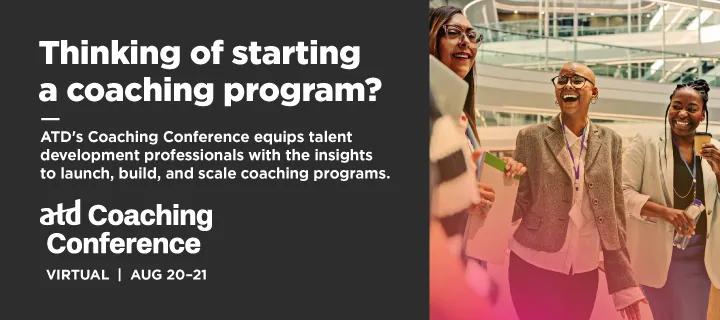ATD Blog
Which Corporate Assessment Is Right for You?
A coach’s guide to choosing the best tool for leadership development, team performance, and career growth.
Wed Jun 18 2025

When I walked into Gallup headquarters for my first coaching certification, I wasn’t planning to become an executive coach—I was a leader trying to solve a leadership gap. I had inherited a department of 1,700 people with technically skilled managers struggling to lead teams. Discovering the power of assessments that day changed everything. Within three years, our team went from one of the worst-performing to top-performing nationally, and I’ve since coached more than 1,000 leaders using assessments as a foundation.
Research shows that only 32 percent of HR professionals believe their companies are effective at developing leaders (McKinsey HR Trends 2025 report). Organizations are prioritizing leadership development, but many still treat assessments as a checklist. Without a coach to translate insights into action, assessments are just information. That’s exactly what I became for my team—a certified expert who turned insights into real change.
Assessments aren’t just personality quizzes. They are a competitive advantage. They help:
Differentiate you in a crowded coaching market.
Make coaching more actionable and structured.
Increase client retention and referrals through measurable insights.
Companies today want data-driven coaching that leads to real transformation.
So let’s talk about the assessments Fortune 500 companies request most—and how you can use them to elevate your coaching practice.
With hundreds of assessments available, it’s important to choose one that aligns with your coaching focus. Here’s a breakdown of six of the most requested assessments in corporate coaching.
1. Myers-Briggs Type Indicator (MBTI)
My Take: MBTI was one of the first assessments I ever used with teams. It’s a great way to open the door to self-awareness, but over time I realized it needs strong facilitation to avoid surface-level conversations. If you use it, add your own coaching frameworks to dig deeper.
After MBTI, if you’re looking for a tool that focuses less on categories and more on strengths, CliftonStrengths might be your next step.
Best For: Coaches working with diverse teams or individuals seeking self-awareness Differentiator: Universal recognition and acceptance
Why Coaches Choose MBTI:
Great for team-building and communication coaching
Helps clients identify how they process information and make decisions
Where MBTI Falls Short:
Not as data-driven or predictive as other assessments
Binary categories can limit nuanced coaching conversations
Choose MBTI If: You need a versatile, widely accepted foundation but want to differentiate your approach.
2. CliftonStrengths (Gallup StrengthsFinder)
My Take: CliftonStrengths completely shifted the way I coach. It’s incredibly empowering to watch clients light up when they realize they don't have to “fix” themselves—they can lead by leaning into their strengths. I use it every day because it makes coaching positive and actionable.
When you’re ready to coach at the executive level and dive into leadership risks, Hogan offers a much deeper lens.
Best For: Coaches focusing on talent development and team optimization Differentiator: Strengths-based approach that resonates with forward-thinking organizations
Why Coaches Choose CliftonStrengths:
Research-backed and widely used in corporate settings
Helps clients align natural talents with their roles
Where CliftonStrengths Falls Short:
Doesn’t address weaknesses, which some leaders believe is necessary
Choose CliftonStrengths If: Your coaching helps clients align strengths with roles and manage weaknesses indirectly.
3. Hogan Personality Inventory (HPI)
My Take: Hogan is where things get serious. It’s the assessment I reach for when coaching executives who need honest conversations about leadership risks. It’s not for the faint of heart—it requires skill to unpack, but the breakthroughs you can create are unmatched.
If you need something simpler and faster for team coaching, DISC can help create immediate understanding and action.
Best For: Executive coaches working with senior leadership Differentiator: Unparalleled depth for leadership development and succession planning
Why Coaches Choose Hogan:
Identifies leadership blind spots
Used for hiring, succession planning, and executive growth
Where Hogan Falls Short:
Requires advanced training to interpret correctly
Choose Hogan If: You specialize in high-level leadership coaching and succession planning.
4. DISC Personality Assessment
My Take: DISC is my go-to for fast-moving teams that need results quickly. It’s simple, it’s powerful, and it’s easy for teams to apply right away. If you’re running team workshops or offsites, DISC gives you a common language fast without overwhelming your clients.
Looking for a more modern, flexible tool that adapts to different work contexts? Lumina Spark offers a fresh alternative.
Best For: Team coaches needing quick implementation and clear results Differentiator: Simplicity and immediate applicability
Why Coaches Choose DISC:
Simple framework for team collaboration
Ideal for leadership development workshops
Where DISC Falls Short:
Less depth than other assessments
Choose DISC If: Your coaching focuses on communication and collaboration.
5. Lumina Spark
My Take: If you want something that feels fresh, modern, and dynamic, Lumina Spark is it. I love using it with tech clients or younger teams who need flexibility and hate feeling “boxed in” by traditional models. It makes self-awareness feel fluid instead of fixed.
And if you want to quickly create a shared language across a team, Insights Discovery’s color-based model is an easy favorite.
Best For: Coaches looking for a modern, dynamic alternative to traditional assessments Differentiator: Flexibility that adapts to behavior changes
Why Coaches Choose Lumina Spark:
Recognizes behavior shifts in different contexts
Interactive app keeps clients engaged
Where Lumina Falls Short:
Less well-known, requiring client education
Choose Lumina If: You want to position your practice as progressive and tech-forward.
6. Insights Discovery
My Take: Insights Discovery is one of the fastest ways I’ve seen a team “click” together. The colors make it memorable and easy to use, but as a coach, you need to make sure you guide teams beyond stereotypes. Done right, it builds instant collaboration.
Best For: Corporate coaches facilitating team development Differentiator: Accessible color-based system that teams readily adopt
Why Coaches Choose Insights:
Creates a shared language that improves collaboration
Practical for team workshops
Where Insights Falls Short:
Can reinforce stereotypes if misinterpreted
Choose Insights If: You facilitate team sessions and need an assessment that creates quick alignment.
Final Takeaways: Choosing the Right Assessment for Your Coaching Practice
If you focus on Leadership Development: Hogan, CliftonStrengths
For Team Collaboration and Communication: Insights Discovery, DISC, Lumina Spark
For Career Development: MBTI, CliftonStrengths
For Hiring and Talent Selection: Hogan, CliftonStrengths
Assessments are powerful tools, but what sets great coaches apart is how they help clients translate insights into action.
Which assessment have you used the most in your coaching—and how has it transformed your client outcomes?
Want to learn more about coaching? Attend the virtual ATD Coaching Conference as experts like Karol Figueroa share how to elevate your skills and programs with the power of coaching.

